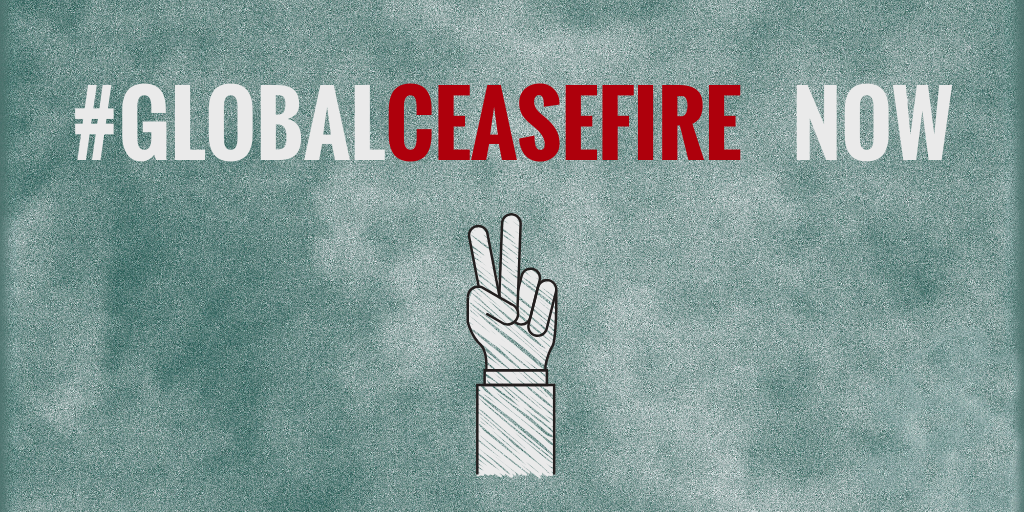
At the beginning of April 2020, JPIT’s four partner Churches joined the UN Secretary General’s call for a global ceasefire in order that Governments can respond to the common threat of Coronavirus.
“The fury of the virus illustrates the folly of war” Antonio Guterres said when announcing the call. “I am calling for an immediate global ceasefire in all corners of the world. It is time to put armed conflict on lockdown and focus together on the true fight of our lives.” Repeating his call in the past few days he said “There should be only one fight in our world today, our shared battle against COVID-19”.
When the Ebola crisis hit in 2014, the Security Council held an emergency meeting, and declared Ebola as a “threat to peace and international security”. This helped to galvanise a collective response from the international community to tackle a common threat. COVID-19 is a global pandemic, but so far there has been no concerted global action to protect the most vulnerable populations. Pre-existing tensions have hindered co-operation and a blame game between the United States and China complicates matters further. The pandemic has the scope to devastate fragile economies, creating social unrest and threatening our common security, yet the silence from the Security Council is deafening.
Some of the most vulnerable people on the planet live in conflict zones. In Syria, after years of war, public health systems are dire. Recently, in the province of Idlib, people have had to flee homes due to the ongoing conflict. In the past six months one million people have been on the move to escape the fighting between the Syrian Government army and militias. With nowhere to go they camp out wherever they can, crowding around water points and with no access to health care. In some supported camps 15 to 20 people share a tent. If COVID-19 were to take hold, there would be death on a massive scale.
Mark Lowcock, Head of the UN Office for the Coordination of Humanitarian Affairs (UNOCHA) in Syria warns that the low number of coronavirus cases recorded in Syria to date are merely “the tip of the iceberg”. A national ceasefire is needed immediately. Geir Pedersen, the UN Special Envoy in Syria spoke to UN Security Council members by video-conference. He urged “We need the kind of sustained period of calm that a nationwide ceasefire would ensure because we need cooperation to take place across the front-lines that riddle Syria’s territory – and this is needed not tomorrow, but now”. Several parties to the conflict in Syria have supported a humanitarian truce yet so far fighting continues in Idlib province as well as other areas.
Syria is but one of a number of conflict regions where people’s vulnerability is heightened through poor health provision and lack of humanitarian access. Thankfully, since the UN Secretary General issued a call for a global ceasefire, parties to conflict have responded in Cameroon, Central African Republic, Colombia, Libya, Myanmar, Philippines, South Sudan, Sudan, Ukraine and Yemen. 70 nations have also endorsed the call as have civil society networks and faith groups.
Dominic Raab MP, UK Foreign Secretary, has tweeted the support for a global ceasefire, but as the UK is a permanent member of the Security Council and the UK’s has troops involved in several war zones, we need to know what this means in practice. Whilst the Government handles the urgent priorities of responding to the effects of the virus at home, the UK also has an important role in building, strengthening and sustaining the global partnerships crucial to combatting this crisis. We call on the UK government to state what specific measures it will take with respect to the UN Security Council and our own actions abroad.
Add your support
Add your voice to the call for a global ceasefire. Sign the petition here:
Tweet your support:
“It’s time to lay down our weapons and join together to overcome #coronavirus. That’s why I’m adding my voice to call for a #GlobalCeasefire. Join with me: http://www.globalceasefire.org/”
